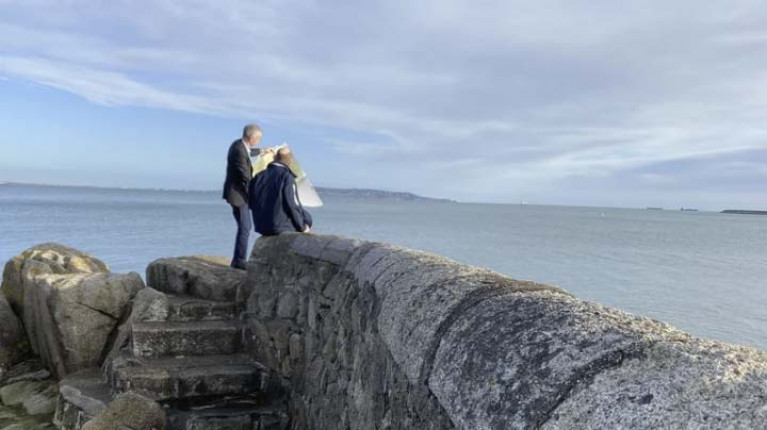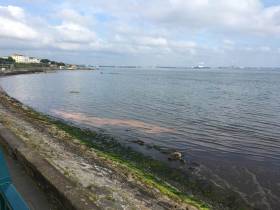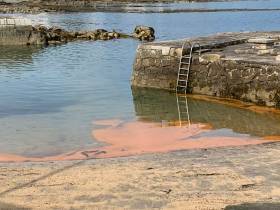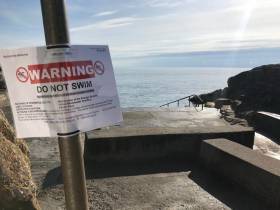Displaying items by tag: Wastewater
The Rivers Trust supports the findings of new report that rings alarm bells about the critical state of water quality management in Northern Ireland and Great Britain.
The Surfers Against Sewage Water Quality Report for 2023 says that in Northern Ireland, there is a lack of the discharge of raw sewage into waters at popular beaches and inland waterways bathing sites — and both anecdotal reports and water quality data suggest the problem is significant.
Mark Horton, all-Ireland director of The Rivers Trust said the report “underscores longstanding environmental concerns we continually raise. The evidence of the effects of sewage and pollution is there and clear.
“The severe algal bloom in Lough Neagh is a stark illustration of the consequences of poor environmental stewardship in Northern Ireland.”
NI’s 2,398 operational sewage overflows — and the sparse data on their performance — emphasise an urgent need for investment in increased monitoring and more transparency so the public can make informed decisions and remedial actions can be taken, The Rivers Trust says.
Horton added: “The management of sewage in Northern Ireland shows a critical need for investment and modernisation. With the absence of a functioning Stormont Executive and no independent environment agency, decisive actions to protect and restore water quality are practically impossible.
“This inaction is unacceptable. Water users in Northern Ireland deserve the same level of safety and information as those elsewhere. Ultimately, we need proper resourcing of Northern Ireland Water to enable it to put in place real-time sewage alerts, so swimmers, surfers and anglers can protect themselves from direct discharges of untreated sewage.”
Horton acknowledged NI water’s plans to deploy monitoring systems by 2024 as “a positive step”, but cautioned that “the lack of clarity on how data will be dissemination and public accessibility to the data remains a concern”.
“Real-time, accessible water quality information isn’t just a nice-to-have; it’s a necessity for the health and safety of our communities and ecosystems,” he said.
Addition of Phosphorous Extraction Plant in Ringsend Could Help Improve Water Quality in River Liffey and Dublin Bay
Europe’s largest phosphorus extraction reactor has been installed at the Ringsend wastewater treatment plant in Dublin, as RTÉ News reports.
Úisce Éireann (formerly Irish Water) says the reactor — which is extracting phosphorous to be turned into agricultural fertiliser — will help protect water quality in the lower River Liffey and Dublin Bay which have experienced potentially harmful algal blooms in recent years.
The new addition is part of a €500 million upgrade works at the Ringsend facility, which treats 40% of all sewage generated in Ireland — well beyond its capacity.
RTÉ News has much more on the story HERE.
The Environmental Protection Agency (EPA) says as much as 500 million litres of potentially untreated wastewater is being released into Ireland’s rivers and coastal waters every day.
As the Irish Independent reports, the agency warns that it will take decades, and billions of euro, to correct the problem — but as yet Irish Water has “no clear action plan or time frame” for remedial works at many of what the EPA identifies as priority areas.
As of the middle of 2022, as many as 32 small towns and villages were discharging raw sewage as they have no wastewater treatment infrastructure.
Overall, the EPA claims that 49% of Ireland’s sewage — far above the EU average of 10% — is “still not treated to the standards set to protect the environment”, according to the agency’s programme manager Noel Byrne.
The Irish Independent has more on the story HERE.
Water Quality May Benefit from New Scheme to treat Waste Water in Smaller Communities
Water quality may benefit from a new 50 million euro funding scheme to provide treatment in small communities without access to public wastewater infrastructure.
Some 547 villages and settlements may be eligible for the scheme which aims to reduce risks to public health and prevent pollution.
It will be funded from the National Development Plan, and will run until 2025, according to Minister for Housing and Local Government Darragh O’Brien.
A baseline survey in 2021 quantified that a total of 547 communities did not have access to the collection and treatment infrastructure provided by Irish Water.
“The improved wastewater services will enable local authorities to work in partnership with the community to enable villages and settlements to be better places to live, work and visit, to support overall Government objectives under “Housing for All”, and give practical effect to our vision for a vibrant rural Ireland,” he said.
The new measure will provide 85% of Exchequer funding through the Department of Housing, Local Government and Heritage, with the remaining 15% in funding coming from the relevant local authority.
The first phase of funding announced this week will focus on areas of “most need”, based on housing and environmental criteria.
The Government’s “Our Rural Future” policy includes measures to address the water and wastewater infrastructural deficits and to support the revitalisation of rural towns and villages.
The baseline review conducted in 2021 recommended that, to ensure all public investment for this measure was sustainable, environmentally and economically justified, the initial investment needed to be directed at carefully selected demonstration projects.
Dublin Bay Water Treatment Not Fit For Purpose, Says Green Party
Water treatment in the capital is not fit for purpose, says the Green Party as it calls for action to improve water quality in Dublin Bay.
The party’s Dun Laoghaire General Election candidate Ossian Smyth told RTÉ News that existing development levies should fund badly needed improvements to the city’s water infrastructure.
Green Party MEP Ciarán Cuffe added that was not acceptable for large parts of Dublin Bay to be unavailable to bathers in the summer months.
It comes after a series of bathing spot closures around the bay last summer — though some of these were prompted by algal blooms not directly related to the release of wastewater.
RTÉ News has more on the story HERE.
The Irish National Sailing & Powerboat School (INSS) has expressed its frustration over the second discharge this month of wastewater into Dublin Bay, which has seen new bathing bans issued at several popular swimming spots in the capital.
While the latest notice does not apply to the waters inside Dun Laoghaire Harbour, the INSS says it has still had to activate its ‘unclean water procedure’ as Salthill beach, from where it usually operates, and other locations woke up to an ‘orange slick’ on the shoreline this morning (Tuesday 25 June). This slick has since been confirmed by the local authority as an algal bloom "not directly associated" with the wastewater overflow.
The procedure involves alterations to activities, use of small keelboats instead of dinghies if appropriate, and stringent instructor supervision to ensure people are on rather than in the water.
While afloat, all safety boats must carry hand-sanitising wipes, and children must regularly wash their hands. Shore side, extensive hand-washing, sanitising gels and a focus on good hygiene practises minimises the risk as much as possible.
“On this occasion, we have been relatively lucky to still be able to operate within the harbour,” said Glyn Williams, the school’s communications and marketing manager.
“However, it’s not good enough that we find out about this later in the day,” he added, referring to the initial reports of the latest bathing ban last night. “The treatment plant operator knew they were discharging. Why not tell everyone straight away?”
Chief instructor Kenneth Rumball also noted that the summer sailing season for children is only 12 weeks long, and with the current water notices lasting until at least this Thursday “we now have six days of a short summer lost to this”.
Responding to Irish Water’s claim that the latest overflow ‘happened as it should have happened’, the school said this cuts little ice with the parents of children attending the its courses.
“Parents are equally as exasperated as we are. While all those we spoke with earlier this morning are understanding, they equally feel that Irish Water/the treatment plant operator should get this solved more quickly than they are currently doing.”
Following similar calls by the likes of Green Party Councillor Ossian Smyth, the INSS is urging those with responsibility to immediately progress upgrades for the sewage system at Ringsend Treatment Plant to cope with heavy rainfall — something Irish Water says would require a “huge amount” of investment.
The school also calls for more transparent communication, in real time, if and when discharges are occurring, coupled with pre-emptive warnings and same-day water sampling results.
Commenting on how these water quality issues affect the development of Dun Laoghaire Harbour as a marine leisure destination, Glyn Williams said: “We have to make sure that we get the basics in place before we undertake large scale plans.
“There’s no point in expending time and money when the most basic requirement for water sports is not in place: safe water to operate in.”
Updated: New Bathing Ban For Dublin Beaches After Heavy Rains Lead To Wastewater Overflow
Heavy rains in recent days have led to another wastewater overflow at the Ringsend treatment plant, as well as other pumping stations, that has prompted a new swimming ban at several Dublin Bay beaches.
It marks the second time this month that bathing has been prohibited at Dollymount Strand, Seapoint, Sandycove and the Forty Foot at Sandycove.
Both Dublin City and Dun Laoghaire-Rathdown councils say their bans will remain in place pending test for water quality, the first results of which are due on Thursday — in a week where Met Éireann forecasts higher temperatures.
While the bans do not affect Dun Laoghaire Harbour or other beaches in either council area, organisers of water-based sporting events have been advised to take note, as The Irish Times reports.
Notices will be put up on beaches today, Tuesday 25 June, according to RTÉ News.
Update 4.30pm: Dun Laoghaire-Rathdown County Council says tests on an ‘orange slick’ at Sandycove Beach confirm the presence of Noctiluca scintillans, a form of algae, and not raw sewage.
In a statement, the council said the non-toxic species is “a natural summer phenomenon in response to long day length, high nutrients and warm water” and is “not directly associated with the waste water overflows associated with the temporary bathing prohibition”.
Inland Fisheries Ireland (IFI) has prosecuted Irish Water for two separate pollution incidents which occurred in Cavan last summer.
On Thursday 6 June, Judge McLoughlin twice convicted Irish Water at Cavan District Court under the Fisheries (Consolidation) Act 1959 for allowing harmful substances to enter the water on two occasions in June last year.
Over 600 fish were killed as a result of one pollution incident while an important habitat for spawning and young fish was damaged as a result of the other.
The court heard evidence from fisheries inspector Cormac Goulding that on 19 June 2018, staff from IFI noticed that the river downstream of the Ballinagh Treatment Plant in Cavan was in very poor condition.
The water was cloudy and the river was covered in sewage fungus and algal growth.
Following an investigation, it was discovered that untreated sewage was being discharged from the water treatment plant and at the pumping station further downstream.
Irish Water issued a report to IFI in response to the prosecution which revealed that their computerised monitoring system had been offline for six days, which meant that no alerts had been received about the problem.
The effluent was being discharged into aquatic habitat suitable for spawning or young trout.
Judge McLoughlin fined Irish Water €3,000 and total costs of €4,679 were awarded to IFI.
A separate pollution incident occurred a few days later on 25 June 2018 in Cavan Town River.
Judge McLoughlin heard evidence from Ailish Keane, senior environmental fisheries officer at IFI, about how the pollution incident resulted in the death of hundreds of fish including 687 native brown trout.
An investigation found that the fish kill was caused by the release of sewage effluent into the river from an overflow culvert located under Farnham Street Bridge.
Irish Water were again convicted and fined €4,000 plus costs of €4,346.
Milton Matthews, director of the North Western River Basin District at IFI, said: “In both cases in Cavan, harmful material was discharged into local rivers and in Cavan town this resulted in a large kill of over 600 native brown trout, of all age classes.
“As it can take years for a waterbody to recover to its former condition following pollution incidents, it is crucial that robust management systems are in place to prevent avoidable incidents which can have a serious impact on our wild fish and their natural habitat.
“The restoration of the aquatic habitat and the maintenance of water quality is vital if we are to enable wild fish populations to recover naturally.
“We are working to protect, conserve and develop our natural fisheries resource which is of significant recreational and economic value to communities in Cavan and across the country.”
Dublin local authorities have issued bathing ban notices for a number of popular swimming spots after a sewage leak at the Ringsend wastewater treatment plant, as RTÉ News reports.
Swimming is currently prohibited along the coast between Dollymount in North Dublin and White Rock Beach in Killiney on the Southside, just beyond Dublin Bay.
The string of bathing spots includes the enduringly popular Forty Foot in Sandycove.
Moreover, Sandymount and Merrion just south of Ringsend — where the wastewater plant was in the news earlier this year over a discharge in the Liffey — have been landed with a swimming ban for the entire 2019 bathing season due to their overall poor water quality.
RTÉ News has more on the story HERE.
Irish Wastewater Schemes Fall Foul Of European Court of Justice
Almost 30 sewage schemes across Ireland fall short of EU directives on wastewater treatment, as The Green News reports.
The European Court of Justice ruling from this past Thursday 28 March now means Ireland could be liable to significant fines if the problem schemes are not addressed.
Among the court’s findings were that Cork city’s strained wastewater treatment scheme was subject to more than 800 spillages of untreated sewage in 2015 alone.
Sensitive areas in Killarney, Longford, Dundalk and Tralee, among others, were also affected by untreated wastewater discharges for which the State has been reprimanded by European judges.
In addition, the State as found guilty of failing to provide for secondary treatment at a number of problem sites including Cobh in Cork Harbour, the fishing harbours of Arklow and Killybegs, and Ringsend in Dublin — the latter of which was the scene of a discharge of ‘activated sludge’ only a month ago.
The Department of Housing and Local Government says it has provided Irish Water “with the necessary resources to both tackle the deficiencies identified by the [ECJ] as well as providing the infrastructure which will underpin the future sustainable development of our country.”
Part of the State’s defence in this case were occasions of ‘unusually heavy rainfall’ that overwhelmed the country’s wastewater management systems.
Such conditions are also linked to the leeching of nitrates and phosphates from agricultural sites causing seaweed blooms in coastal areas, as highlighted by a recent academic report.
The news also comes after oral hearings began into a long-planned €500 million wastewater treatment scheme for North Dublin that faces strong local oppositions.
The Green News has more on the story HERE.


































































